Latest Sheet Music
Yann Tiersen

Guillaume Yann Tiersen (born 23 June 1970) is a French musician and composer known internationally for composing the score to the Jean-Pierre Jeunet movie Amélie. His music is recognized by its use of a large variety of instruments in relatively minimalist compositions, often with a touch of either European classical music or French folk music, using primarily the piano, accordion or violin together with instruments like the melodica, xylophone, toy piano, ondes martenot, harpsichord and typewriter. His musical style is reminiscent of Frédéric Chopin, Erik Satie, Philip Glass and Michael Nyman.
Cannonball Adderley
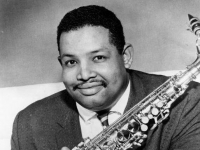
Julian Edwin "Cannonball" Adderley was an American jazz alto saxophonist of the hard bop era of the 1950s and 1960s. Adderley is remembered for his 1966 soul jazz single "Mercy, Mercy, Mercy", a crossover hit on the pop charts
Traditional

Adam Sandler
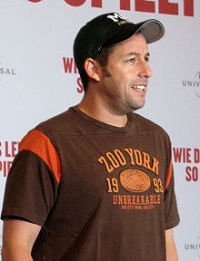
Adam Richard Sandler (born September 9, 1966) is an American actor, comedian, musician, screenwriter and film producer. He is the founder of Happy Madison Productions, a film production company that also developed the television series Rules of Engagement.
After becoming a Saturday Night Live cast member, he went on to star in several Hollywood feature films that grossed over US$100 million at the box office. He is best known for his comedic roles, such as in the films Billy Madison (1995), Big Daddy (1999), and Mr. Deeds (2002), though he has ventured into more dramatic territory.
After becoming a Saturday Night Live cast member, he went on to star in several Hollywood feature films that grossed over US$100 million at the box office. He is best known for his comedic roles, such as in the films Billy Madison (1995), Big Daddy (1999), and Mr. Deeds (2002), though he has ventured into more dramatic territory.
Jean Philippe Rameau
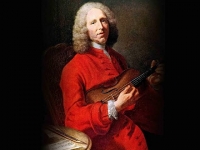
Jean-Philippe Rameau was one of the most important French composers and music theorists of the 18th century. He replaced Jean-Baptiste Lully as the dominant composer of French opera and is also considered the leading French composer for the harpsichord of his time, alongside François Couperin
E.A.Mario

Giovanni Gaeta (1884 – 24 June 1961) was the real name of the Italian poet, writer and musician better known as E. A. Mario. He took the E of his assumed name from the initial letter of the pseudonym Ermes under which he wrote for the newspaper Il Ventesimo; the A came from Alessandro, the paper's chief editor; and Mario was the name of its Polish director.Gaeta composed and wrote the lyrics to more than 2,000 works in Italian and Neapolitan. In 1918, he wrote La leggenda del Piave, which at the birth of the Italian Republic was a candidate for the Italian national anthem. His other famous works include Santa Lucia luntana, Balocchi e profumi, Vipera, Rose rosse, and O' Paese dò sole.
Brown Eyed Girls

The Brown Eyed Girls, often abbreviated as B.E.G., BG, or 브아걸, is a South Korean girl group with four members: JeA, Miryo, Narsha, and Gain. They debuted as an R&B/Ballad vocal group with "Come Closer" in 2006 and have since performed in a variety of music genres.
John Mapes
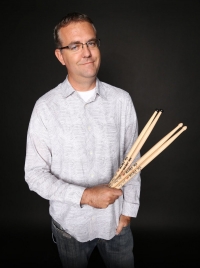
John Mapes Musical artist EPs: Everyday Is a Battle, Live & Learn Genre: Pop, Folk Songs My Own Drum My Own Drum · 2021 Another 80's Song Rut · 2011 Kristy McNichol Rut · 2011.
Yasushi Asada

Yasushi Asada is a Japanese video game music composer. He has contributed with songs to the soundtracks of Super Monkey Ball: Banana Blitz and Castlevania Judgment. He is a member of Noisycroak, a Tokyo-based sound design company focused on game soundtracks.
Allen Pote
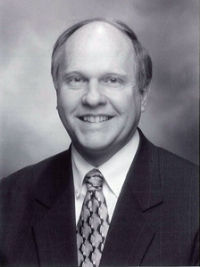
ALLEN POTE (b. 1945) was born in Halstead, Kansas, and educated at Texas Christian University, where his diploma was in Church Music. A Fulbright Scholar, he studied in Brussels, Belgium, and took advanced work at Union Theological Seminary in New York City. For twenty-two years he served as a full-time Director of Music in churches in Texas and Florida. He is currently a full-time composer living in Pensacola, Florida, where, with his wife Susan, he is co-director of the Pensacola Children's Choir, an organization of over 200 singers which has achieved national recognition. Most of his compositions today are available from Hope. As of 2007, the Hope website catalog listed 76 separate Allen Pote titles. He has collaborated with Tom Long for several very successful children's musicals, including RESCUE IN THE NIGHT, THE ROCK SLINGER AND HIS GREATEST HIT, ONCE UPON A PARABLE, MALICE IN THE PALACE, CHIMES IN THE NIGHT and LIFE OF THE PARTY.
Dresden Dolls

The Dresden Dolls are an American musical duo from Boston, Massachusetts. Formed in 2001, the group consists of Amanda Palmer (vocals, piano, harmonica, ukelele) and Brian Viglione (drums, percussion, guitar, vocals). The two describe their style as "Brechtian punk cabaret", a phrase invented by Palmer because she was "terrified" that the press would invent a name that "would involve the word gothic." The Dresden Dolls are part of an underground dark cabaret movement that started gaining momentum in the early 1990s.
Wicked

Wicked is a musical with songs and lyrics by Stephen Schwartz and a book by Winnie Holzman. The story is based on the best-selling novel Wicked: The Life and Times of the Wicked Witch of the West by Gregory Maguire, a parallel novel of L. Frank Baum's classic story The Wonderful Wizard of Oz from the perspective of the witches of the Land of Oz.
Wicked tells the story of Elphaba, the future Wicked Witch of the West and her relationship with Glinda, the Good Witch of the North. Their friendship struggles through their opposing personalities and viewpoints, rivalry over the same love-interest, their reactions to the Wizard's corrupt government, and, ultimately, Elphaba's public fall from grace. The plot is set mostly before Dorothy's arrival from Kansas, and includes several references to well-known scenes and dialogue in the 1939 film The Wizard of Oz.
The musical debuted on Broadway on October 30, 2003. It is produced by Universal Pictures and directed by Joe Mantello, with musical staging by Wayne Cilento. Its original stars were Idina Menzel as Elphaba, Kristin Chenoweth as Glinda, and Joel Grey as the Wizard. Although the production received mixed reviews and was panned by The New York Times, it has proved to be a favorite among patrons. The Broadway production's success spawned productions in Chicago, Los Angeles, London's West End, Tokyo, Melbourne, and Stuttgart, along with two North American tours that have visited over 30 cities in Canada and the United States.
The score of Wicked is heavily thematic, bearing in some senses more resemblance to a film score than a musical's score. While many musicals' scores develop new motifs and melodies for each song with little overlap, Schwartz integrated a handful of leitmotifs throughout the production. A cast recording of the original Broadway production was released on December 16, 2003, by Universal Music. All of the songs featured on stage are present on the recording with the exception of "The Wizard And I (Reprise)" and "The Wicked Witch of the East". The short reprise of "No One Mourns The Wicked" that opens Act II is attached to the beginning of "Thank Goodness". The music was arranged by Stephen Oremus, who was also the conductor and director, and James Lynn Abbott, with orchestrations by William David Brohn. The recording received the Grammy Award for Best Musical Show Album in 2005 and was certified platinum by the RIAA on November 30, 2006.
Wicked tells the story of Elphaba, the future Wicked Witch of the West and her relationship with Glinda, the Good Witch of the North. Their friendship struggles through their opposing personalities and viewpoints, rivalry over the same love-interest, their reactions to the Wizard's corrupt government, and, ultimately, Elphaba's public fall from grace. The plot is set mostly before Dorothy's arrival from Kansas, and includes several references to well-known scenes and dialogue in the 1939 film The Wizard of Oz.
The musical debuted on Broadway on October 30, 2003. It is produced by Universal Pictures and directed by Joe Mantello, with musical staging by Wayne Cilento. Its original stars were Idina Menzel as Elphaba, Kristin Chenoweth as Glinda, and Joel Grey as the Wizard. Although the production received mixed reviews and was panned by The New York Times, it has proved to be a favorite among patrons. The Broadway production's success spawned productions in Chicago, Los Angeles, London's West End, Tokyo, Melbourne, and Stuttgart, along with two North American tours that have visited over 30 cities in Canada and the United States.
The score of Wicked is heavily thematic, bearing in some senses more resemblance to a film score than a musical's score. While many musicals' scores develop new motifs and melodies for each song with little overlap, Schwartz integrated a handful of leitmotifs throughout the production. A cast recording of the original Broadway production was released on December 16, 2003, by Universal Music. All of the songs featured on stage are present on the recording with the exception of "The Wizard And I (Reprise)" and "The Wicked Witch of the East". The short reprise of "No One Mourns The Wicked" that opens Act II is attached to the beginning of "Thank Goodness". The music was arranged by Stephen Oremus, who was also the conductor and director, and James Lynn Abbott, with orchestrations by William David Brohn. The recording received the Grammy Award for Best Musical Show Album in 2005 and was certified platinum by the RIAA on November 30, 2006.
Nickelback

Nickelback is a Canadian post-grunge band formed in Hanna, Alberta by Chad Kroeger, Mike Kroeger, Ryan Peake and then-drummer Brandon Kroeger (the current drummer of Nickelback being Daniel Adair). The band is one of the most popular of the modern post-grunge genre, along with groups such as 3 Doors Down and Daughtry, performing in a significantly more radio-friendly style than the traditional, early 1990s grunge music era. Although the founders of the band hail from Hanna, Alberta, a small town east of Calgary, they are now based in Vancouver, British Columbia, Canada. The band's name originates from the nickel in change that band member Mike Kroeger gave customers at his Starbucks job—he would frequently say, "Here's your nickel back".
The band is signed to EMI at home and Roadrunner Records for the rest of the world. In July 2008, the band signed with Live Nation for three touring and album cycles, with an option for a fourth cycle. The contract includes recordings, touring, merchandise and other rights.
The band is signed to EMI at home and Roadrunner Records for the rest of the world. In July 2008, the band signed with Live Nation for three touring and album cycles, with an option for a fourth cycle. The contract includes recordings, touring, merchandise and other rights.
Waldemar Henrique
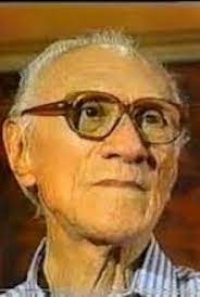
Waldemar Henrique da Costa Pereira (February 15, 1905 – March 29, 1995) was a Brazilian pianist and composer.
Waldemar Henrique was born in Belém do Pará, Brazil, of mixed Portuguese and indigenous parentage. After losing his mother early in life, he went to Portugal with this father, returning to Brazil in 1918. Then he began travelling through the Amazon Rainforest, and started to become acquainted with amazon culture and folklore that would later be significant on his musical work.The first successful work he composed was Minha Terra (My Land), written in 1923. In 1929 he studied on the Conservatório Carlos Gomes. His family was against his musical career, and his father insisted him to give it up by employing him on a bank.
Waldemar Henrique was born in Belém do Pará, Brazil, of mixed Portuguese and indigenous parentage. After losing his mother early in life, he went to Portugal with this father, returning to Brazil in 1918. Then he began travelling through the Amazon Rainforest, and started to become acquainted with amazon culture and folklore that would later be significant on his musical work.The first successful work he composed was Minha Terra (My Land), written in 1923. In 1929 he studied on the Conservatório Carlos Gomes. His family was against his musical career, and his father insisted him to give it up by employing him on a bank.
Bach

Johann Sebastian Bach (31 March 1685 – 28 July 1750) was a German composer and organist whose sacred and secular works for choir, orchestra, and solo instruments drew together the strands of the Baroque period and brought it to its ultimate maturity. Although he introduced no new forms, he enriched the prevailing German style with a robust contrapuntal technique, an unrivalled control of harmonic and motivic organisation in composition for diverse musical forces, and the adaptation of rhythms and textures from abroad, particularly Italy and France.
Revered for their intellectual depth and technical and artistic beauty, Bach's works include the Brandenburg concertos; the Goldberg Variations; the English Suites, French Suites, Partitas, and Well-Tempered Clavier; the Mass in B Minor; the St. Matthew Passion; the St. John Passion; The Musical Offering; The Art of Fugue; the Sonatas and Partitas for violin solo; the Cello Suites; more than 200 surviving cantatas; and a similar number of organ works, including the celebrated Toccata and Fugue in D Minor.
While Bach's fame as an organist was great during his lifetime, he was not particularly well-known as a composer. His adherence to Baroque forms and contrapuntal style was considered "old-fashioned" by his contemporaries, especially late in his career when the musical fashion tended towards Rococo and later Classical styles. A revival of interest and performances of his music began early in the 19th century, and he is now widely considered to be one of the greatest composers in the Western tradition.
Revered for their intellectual depth and technical and artistic beauty, Bach's works include the Brandenburg concertos; the Goldberg Variations; the English Suites, French Suites, Partitas, and Well-Tempered Clavier; the Mass in B Minor; the St. Matthew Passion; the St. John Passion; The Musical Offering; The Art of Fugue; the Sonatas and Partitas for violin solo; the Cello Suites; more than 200 surviving cantatas; and a similar number of organ works, including the celebrated Toccata and Fugue in D Minor.
While Bach's fame as an organist was great during his lifetime, he was not particularly well-known as a composer. His adherence to Baroque forms and contrapuntal style was considered "old-fashioned" by his contemporaries, especially late in his career when the musical fashion tended towards Rococo and later Classical styles. A revival of interest and performances of his music began early in the 19th century, and he is now widely considered to be one of the greatest composers in the Western tradition.
Alexandru Pascanu
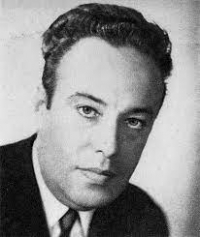
Alexandru Pașcanu (born May 3, 1920, Bucharest - d. July 6, 1989 Bucharest) was a Romanian composer and music teacher.He studied between 1938 and 1946 at the Bucharest Conservatory, with Marțian Negrea, Nicolae Brânzeu, Dimitrie Cuclin, Constantin Brăiloiu and Ionel Perlea as teachers. In parallel, he attended the courses of the Faculty of Law in Bucharest (1938-1944). From 1952 he taught music and solfeggio at the Conservatory, and from 1966 he became professor of harmony. In addition to other articles on music theory, he also published a two-volume Treatise on Harmony, reissued several times.
Wee Sing

Wee Sing is a songbook series published by Price Stern Sloan. It would also inspire a series of children's CDs, cassettes, coloring books, toys, videos, and apps.
Young blood brass band
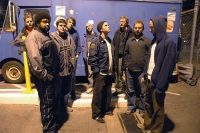
The Youngblood Brass Band is an American brass band from Madison, Wisconsin that was established in 1998. The band has released six albums and has toured throughout the United States and Europe.[The band's founding members, sousaphonist Nat McIntosh and snare drummer/lyricist David Henzie-Skogen both went to Oregon High School in Oregon, Wisconsin and first played together in 1994. The band came together in 1995 as the One Lard Biskit Brass Band, subsequently releasing the album Better Recognize locally.
Rob Thomas

Robert Kelly Thomas (born February 14, 1972, in Landstuhl, Germany on a US military base) is an American rock recording artist, and songwriter. He is the primary songwriter and lead singer of the band Matchbox Twenty and formerly of the band Tabitha's Secret. Thomas also records and performs as a solo artist. Thomas earned three Grammy awards for co-writing and singing on the Carlos Santana triple-platinum hit "Smooth" on the album Supernatural in 1999.
He has also lent his songwriting talents to such artists as Willie Nelson, Mick Jagger, Marc Anthony, Pat Green, Taylor Hicks, Travis Tritt and Daughtry.
Since 1996, his band, Matchbox Twenty, has released a string of hit singles to radio including "Push", "3 A.M.", "Real World", "Back 2 Good", "Bent", "If You're Gone", "Mad Season", "Disease", "Unwell", "Bright Lights", and "How Far We've Come". In 2004, the Songwriters Hall of Fame awarded Thomas its first Starlight Award, recognizing young songwriters who have already made a lasting impact in the music industry.
He has also lent his songwriting talents to such artists as Willie Nelson, Mick Jagger, Marc Anthony, Pat Green, Taylor Hicks, Travis Tritt and Daughtry.
Since 1996, his band, Matchbox Twenty, has released a string of hit singles to radio including "Push", "3 A.M.", "Real World", "Back 2 Good", "Bent", "If You're Gone", "Mad Season", "Disease", "Unwell", "Bright Lights", and "How Far We've Come". In 2004, the Songwriters Hall of Fame awarded Thomas its first Starlight Award, recognizing young songwriters who have already made a lasting impact in the music industry.
Elton John

Sir Elton Hercules John CBE (born Reginald Kenneth Dwight on 25 March 1947) is an English pop/rock singer, composer and pianist.
In his four-decade career, John has been one of the dominant forces in rock and popular music, especially during the 1970s. He has sold over 200 million records, making him one of the most successful artists of all time. He has more than 50 Top 40 hits including seven consecutive No. 1 U.S. albums, 59 Top 40 singles, 16 Top 10, four No. 2 hits, and nine No. 1 hits. He has won five Grammy awards and one Academy Award. His success has had a profound impact on popular music and has contributed to the continued popularity of the piano in rock and roll. In 2004, Rolling Stone ranked him #49 on their list of the 100 greatest artists of all time.
Some of the characteristics of John's musical talent include an ability to quickly craft melodies for the lyrics of songwriting partner Bernie Taupin, his former rich tenor (now baritone) voice, his classical and gospel-influenced piano, the aggressive orchestral arrangements of Paul Buckmaster among others and the flamboyant fashions, outlandishly excessive eyeglasses, and on-stage showmanship, especially evident during the 1970s.
John was inducted into the Rock and Roll Hall of Fame in 1994. He has been heavily involved in the fight against AIDS since the late 1980s, and was knighted in 1998. He entered into a civil partnership with David Furnish on 21 December 2005 and continues to be a champion for LGBT social movements. On April 9, 2008, John held a benefit concert for Hillary Clinton's presidential campaign, raising $2.5 million.
In his four-decade career, John has been one of the dominant forces in rock and popular music, especially during the 1970s. He has sold over 200 million records, making him one of the most successful artists of all time. He has more than 50 Top 40 hits including seven consecutive No. 1 U.S. albums, 59 Top 40 singles, 16 Top 10, four No. 2 hits, and nine No. 1 hits. He has won five Grammy awards and one Academy Award. His success has had a profound impact on popular music and has contributed to the continued popularity of the piano in rock and roll. In 2004, Rolling Stone ranked him #49 on their list of the 100 greatest artists of all time.
Some of the characteristics of John's musical talent include an ability to quickly craft melodies for the lyrics of songwriting partner Bernie Taupin, his former rich tenor (now baritone) voice, his classical and gospel-influenced piano, the aggressive orchestral arrangements of Paul Buckmaster among others and the flamboyant fashions, outlandishly excessive eyeglasses, and on-stage showmanship, especially evident during the 1970s.
John was inducted into the Rock and Roll Hall of Fame in 1994. He has been heavily involved in the fight against AIDS since the late 1980s, and was knighted in 1998. He entered into a civil partnership with David Furnish on 21 December 2005 and continues to be a champion for LGBT social movements. On April 9, 2008, John held a benefit concert for Hillary Clinton's presidential campaign, raising $2.5 million.
Spandau Ballet

Spandau Ballet was a popular British band in the 1980s. Initially inspired by a mixture of funk and synthpop, the group eventually mellowed into a mainstream pop act.
Members:
Tony Hadley
Gary Kemp
Martin Kemp
Steve Norman
John Keeble
Members:
Tony Hadley
Gary Kemp
Martin Kemp
Steve Norman
John Keeble
Heitor Villa-Lobos

Heitor Villa-Lobos (March 5, 1887 – November 17, 1959) was a Brazilian composer, described as "the single most significant creative figure in 20th-century Brazilian art music". Villa-Lobos has become the best-known and most significant Latin American composer to date. He wrote numerous orchestral, chamber, instrumental and vocal works. His music was influenced by both Brazilian folk music and by stylistic elements from the European classical tradition, as exemplified by his Bachianas Brasileiras ("Brazilian Bachian-pieces").
His earliest pieces originated in guitar improvisations, for example Panqueca ("Pancake") of 1900. The concert series of 1915–21 included first performances of pieces demonstrating originality and virtuosic technique. Some of these pieces are early examples of elements of importance throughout his œuvre. His attachment to the Iberian Peninsula is demonstrated in Canção Ibéria of 1914 and in orchestral transcriptions of some of Enrique Granados' piano Goyescas (1918, now lost). Other themes that were to recur in his later work include the anguish and despair of the piece Desesperança— Sonata Phantastica e Capricciosa no. 1 (1915), a violin sonata including "histrionic and violently contrasting emotions", the birds of L'oiseau blessé d'une flèche (1913), the mother-child relationship (not usually a happy one in Villa-Lobos's music) in Les mères of 1914, and the flowers of Suíte floral for piano of 1916–18 which reappeared in Distribuição de flores for flute and guitar of 1937.
Reconciling European tradition and Brazilian influences was also an element that bore fruit more formally later. His earliest published work Pequena suíte for cello and piano of 1913 shows a love for the cello, but is not notably Brazilian, although it contains elements that were to resurface later. His three-movement String Quartet no. 1 (Suíte graciosa) of 1915 (expanded to six movements ca. 1947) is influenced by European opera, while Três danças características (africanas e indígenas) of 1914–16 for piano, later arranged for octet and subsequently orchestrated, is radically influenced by the tribal music of the Caripunas Indians of Mato Grosso.
With his tone poems Amazonas (1916, first performed in Paris in 1929) and Uirapurú (1916, first performed 1935) he created works dominated by indigenous Brazilian influences. The works use Brazilian folk tales and characters, imitations of the sounds of the jungle and its fauna, imitations of the sound of the nose-flute by the violinophone, and not least imitations of the uirapuru itself.
His earliest pieces originated in guitar improvisations, for example Panqueca ("Pancake") of 1900. The concert series of 1915–21 included first performances of pieces demonstrating originality and virtuosic technique. Some of these pieces are early examples of elements of importance throughout his œuvre. His attachment to the Iberian Peninsula is demonstrated in Canção Ibéria of 1914 and in orchestral transcriptions of some of Enrique Granados' piano Goyescas (1918, now lost). Other themes that were to recur in his later work include the anguish and despair of the piece Desesperança— Sonata Phantastica e Capricciosa no. 1 (1915), a violin sonata including "histrionic and violently contrasting emotions", the birds of L'oiseau blessé d'une flèche (1913), the mother-child relationship (not usually a happy one in Villa-Lobos's music) in Les mères of 1914, and the flowers of Suíte floral for piano of 1916–18 which reappeared in Distribuição de flores for flute and guitar of 1937.
Reconciling European tradition and Brazilian influences was also an element that bore fruit more formally later. His earliest published work Pequena suíte for cello and piano of 1913 shows a love for the cello, but is not notably Brazilian, although it contains elements that were to resurface later. His three-movement String Quartet no. 1 (Suíte graciosa) of 1915 (expanded to six movements ca. 1947) is influenced by European opera, while Três danças características (africanas e indígenas) of 1914–16 for piano, later arranged for octet and subsequently orchestrated, is radically influenced by the tribal music of the Caripunas Indians of Mato Grosso.
With his tone poems Amazonas (1916, first performed in Paris in 1929) and Uirapurú (1916, first performed 1935) he created works dominated by indigenous Brazilian influences. The works use Brazilian folk tales and characters, imitations of the sounds of the jungle and its fauna, imitations of the sound of the nose-flute by the violinophone, and not least imitations of the uirapuru itself.
Henry Fillmore

Henry Fillmore (December 3, 1881 – December 7, 1956) was an American musician, composer, publisher, and bandleader, best known for his many marches and screamers.In the 1920s Fillmore was back in Cincinnati conducting the Shriners Temple Band, which he turned into one of the best marching bands in the country.In 1938 Fillmore, after being advised by a physician that he had just a few months to live, retired to Miami, Florida. He went on, however, to prove the physician wrong. So Fillmore kept an active schedule rehearsing high school bands in Florida and composing marches. Henry Fillmore Band Hall, the rehearsal hall for many of the University of Miami's performing groups, acquired its name as a tribute to Fillmore's work in the band genre. His march "Orange Bowl" was written for Miami's Band of the Hour. Uncle Henry, as Fillmore was affectionately known to the members of the Band of the hour, also wrote the University of Miami's current official fight song – "Miami U How-De-Doo". His arrangement of "The Star-Spangled Banner" is the traditional arrangement performed by the Florida State University Marching Chiefs. His march "Men of Florida" was composed for the bands at the University of Florida. He was given an Honorary Doctorate of Music by the University of Miami in 1956 in recognition of his career. Fillmore lived out the rest of his days in South Florida.
Vladimir Cosma
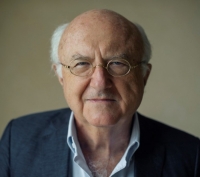
Vladimir Cosma (born 13 April 1940) is a Romanian-born French composer, conductor and violinist.
He was born into a family of musicians. His father, Teodor Cosma, was a pianist and conductor, his mother a writer-composer, his uncle, Edgar Cosma, composer and conductor, and one of his grandmothers, pianist, a student of the renowned Ferruccio Busoni.
He was born into a family of musicians. His father, Teodor Cosma, was a pianist and conductor, his mother a writer-composer, his uncle, Edgar Cosma, composer and conductor, and one of his grandmothers, pianist, a student of the renowned Ferruccio Busoni.
Debussy

Achille-Claude Debussy (August 22, 1862 – March 25, 1918) was a French composer. Along with Maurice Ravel, he is considered one of the most prominent figures working within the field of Impressionist music, though he himself intensely disliked the term when applied to his compositions. Debussy was not only among the most important of all French composers but also was a central figure in all European music at the turn of the twentieth century.
Debussy's music virtually defines the transition from late-Romantic music to twentieth century modernist music. In French literary circles, the style of this period was known as Symbolism, a movement that directly inspired Debussy both as a composer and as an active cultural participant.
Debussy's music virtually defines the transition from late-Romantic music to twentieth century modernist music. In French literary circles, the style of this period was known as Symbolism, a movement that directly inspired Debussy both as a composer and as an active cultural participant.
Fábio Zanon
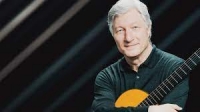
Born: March 6, 1966 (age 56 years), Jundiaí, State of São Paulo, Brazil Albums: The Romantic Guitar, MORE
Genre: ClassicalEducation: University of São Paulo, Royal Academy of Music Record labels: Naxos, Musical Heritage Society, Tratore, Phaedra, MusicMasters, Fabio Zanon .
Genre: ClassicalEducation: University of São Paulo, Royal Academy of Music Record labels: Naxos, Musical Heritage Society, Tratore, Phaedra, MusicMasters, Fabio Zanon .
Genesis
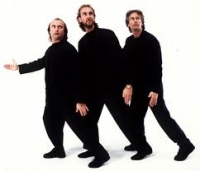
Genesis are an English rock band that formed in 1967. The band currently comprises the longest-tenured members Phil Collins, Mike Rutherford and Tony Banks. Past members Peter Gabriel, Anthony Phillips and Steve Hackett also played major roles in the band in its early years. Genesis are among the top 30 highest-selling recording artists of all time with approximately 150 million albums sold worldwide.
Gabriel Faure

Gabriel Urbain Fauré (12 May 1845 – 4 November 1924) was a French composer, organist, pianist, and teacher. He was the foremost French composer of his generation, and his musical style influenced many 20th century composers. His harmonic and melodic language affected how harmony was later taught.
Tchaikovsky

Pyotr Il'yich Tchaikovsky (May 7 1840 â November 6 1893) was a Russian composer of the Romantic era. While not part of the nationalistic music group known as "The Five", Tchaikovsky wrote music which, in the opinion of Harold Schonberg, was distinctly Russian: plangent, introspective, with modally-inflected melody and harmony.
Aesthetically, Tchaikovsky remained open to all aspects of Saint Petersburg musical life. He was impressed by Serov and Balakirev as well as the classical values upheld by the conservatory. Both the progressive and conservative camps in Russian music at the time attempted to win him over. Tchaikovsky charted his compositional course between these two factions, retaining his individuality as a composer as well as his Russian identity. In this he was influenced by the ideals of his teacher Nikolai Rubinstein and Nikolai's brother Anton.
Tchaikovsky's musical cosmopolitanism led him to be favored by many Russian music-lovers over the "Russian" harmonies and styles of Mussorgsky, Borodin and Rimsky-Korsakov.
Nonetheless he frequently adapted Russian traditional melodies and dance forms in his music, which enhanced his success in his home country. The success in St. Petersburg at the premiere of his Third Orchestral Suite may have been due in large part to his concluding the work with a polonaise. He also used a polonaise for the final movement of his Third Symphony.
Aesthetically, Tchaikovsky remained open to all aspects of Saint Petersburg musical life. He was impressed by Serov and Balakirev as well as the classical values upheld by the conservatory. Both the progressive and conservative camps in Russian music at the time attempted to win him over. Tchaikovsky charted his compositional course between these two factions, retaining his individuality as a composer as well as his Russian identity. In this he was influenced by the ideals of his teacher Nikolai Rubinstein and Nikolai's brother Anton.
Tchaikovsky's musical cosmopolitanism led him to be favored by many Russian music-lovers over the "Russian" harmonies and styles of Mussorgsky, Borodin and Rimsky-Korsakov.
Nonetheless he frequently adapted Russian traditional melodies and dance forms in his music, which enhanced his success in his home country. The success in St. Petersburg at the premiere of his Third Orchestral Suite may have been due in large part to his concluding the work with a polonaise. He also used a polonaise for the final movement of his Third Symphony.
Chris Brown

Christopher Maurice Brown (born May 5, 1989) is a Grammy nominated American R&B and pop singer-songwriter, dancer, music video director and actor. He made his recording debut in late 2005 with Chris Brown at the age of 16. The album featured the hit single "Run It!", which topped the Billboard 100, making Brown the first male artist to have his debut single go to the top. The album sold two million copies in the United States and was subsequently certified multi-platinum by the RIAA.
Brown's second studio album, Exclusive was released worldwide in November 2007. It spawned two successful singles; his second US number one hit, "Kiss Kiss" featuring T-Pain. and "With You", which topped out at number 2 on the Billboard Hot 100. The latest single "Forever" was released in May 2008 off the deluxe Exclusive: The Forever Edition and has so far has peaked at number 2 on Billboard Hot 100. Exclusive has gone platinum, moving over one million units.
In addition to his solo commercial success, Brown has been featured on several hits such as "No Air a duet with singer Jordin Sparks, "Shortie like Mine" with the rapper Bow Wow and "Shawty Get Loose" alongside Lil Mama and T-Pain. The songs have topped out #3, #9 and #10 on the Hot 100 respectively. Brown has been compared due to his vocal and dance talents to renowned R&B artists such as Usher and Michael Jackson and has named both as large influences on his music.
Brown's second studio album, Exclusive was released worldwide in November 2007. It spawned two successful singles; his second US number one hit, "Kiss Kiss" featuring T-Pain. and "With You", which topped out at number 2 on the Billboard Hot 100. The latest single "Forever" was released in May 2008 off the deluxe Exclusive: The Forever Edition and has so far has peaked at number 2 on Billboard Hot 100. Exclusive has gone platinum, moving over one million units.
In addition to his solo commercial success, Brown has been featured on several hits such as "No Air a duet with singer Jordin Sparks, "Shortie like Mine" with the rapper Bow Wow and "Shawty Get Loose" alongside Lil Mama and T-Pain. The songs have topped out #3, #9 and #10 on the Hot 100 respectively. Brown has been compared due to his vocal and dance talents to renowned R&B artists such as Usher and Michael Jackson and has named both as large influences on his music.
Yuki Kajiura

Yuki Kajiura (梶浦 由記 Kajiura Yuki?, born August 6, 1965 in Tokyo, Japan) is a Japanese composer and music producer. She has provided the music for several popular anime series, such as the final Kimagure Orange Road movie, Noir, .hack//Sign, Aquarian Age, Madlax, My-HiME, My-Otome, .hack//Roots, Pandora Hearts, Puella Magi Madoka Magica, Sword Art Online, Tsubasa Chronicle and the Kara no Kyoukai movies (amongst others). She also assisted Toshihiko Sahashi with Mobile Suit Gundam SEED and Mobile Suit Gundam SEED Destiny. Kajiura has also composed for video games, including the cutscene music for Xenosaga II and the entire Xenosaga III game soundtrack.
Per Olov Kindgren
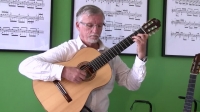
Per-Olov Kindgren (born June 10, 1956 in Bogotá, Colombia) is a Swedish classical guitarist, composer and music teacher known for his classical guitar playing, ranging from Bach to The BeatlesKindgren was born in Bogotá, Colombia, to a Swedish father and a Danish mother. Kindgren's father, Owe, an engineer, worked for the Colombian branch of LM Ericsson installing telephone stations. The family returned to Stockholm when Kindgren was three years old. He lived there from 1960 till 1970. At the age of six, Kindgren was fascinated by a bright red electric guitar in a shop window.
Ador Torres
Ador Torres Musician Songs Leron Leron Sinta Halina't Umawit · 1962 Dandansoy Philippine Folk Songs · 1970
O Naraniag a bulan Pamulinawen · 2002
O Naraniag a bulan Pamulinawen · 2002
Benny Andersson
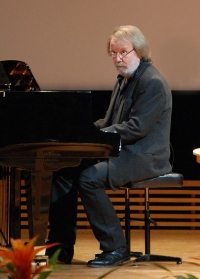
Göran Bror Benny Andersson (born in Stockholm, Sweden on 16 December 1946) is a Swedish musician, composer, a former member of the Swedish musical group ABBA (1972-1982), and co-composer of the musicals Chess, Kristina från Duvemåla, and Mamma Mia!. Currently active with his own band Benny Anderssons Orkester (BAO!), and executive-producing the film version of the musical Mamma Mia! ABBA is one of the best known 70's musical groups.
G. F. Handel
George Frideric Handel (German: Georg Friedrich Händel; pronounced ) (23 February 1685 – 14 April 1759) was a German-English Baroque composer who is famous for his operas, oratorios, and concerti grossi. Handel was born in Germany in the same year as JS Bach and Domenico Scarlatti. He received critical musical training in Italy before settling in London and becoming a naturalised British subject. His works include Messiah, Water Music, and Music for the Royal Fireworks. He was strongly influenced by the techniques of the great composers of the Italian Baroque and the English composer Henry Purcell. Handel's music was well-known to many composers, including Haydn, Mozart, and Beethoven.
Dewey Bunneli

Lee Merton "Dewey" Bunnell is a British-American musician, singer, guitarist, and songwriter, best known as a member of the folk rock band America.
Linkin Park

Linkin Park is an American rock band from Agoura Hills, California. Since their formation in 1996, the band has sold more than 50 million albums and won two Grammy Awards. They achieved mainstream success with their debut album, Hybrid Theory, which was certified Diamond by the RIAA in 2005. Their following studio album, Meteora, continued the band's success, topping the Billboard 200’s album charts in 2003, and was followed by extensive touring and charity work around the world.
Recognized for their adaptation of the nu metal and rap rock genre into a radio-friendly yet densely-layered style in Hybrid Theory and Meteora, the band moved away from this and explored a variety of other genres in their latest studio album, Minutes to Midnight. The album topped the Billboard charts and had the third best debut week of any album that year. They are also known for their several collaborations, most notably with rapper Jay-Z in their mash-up album Collision Course, and many other artists on Reanimation.
Recognized for their adaptation of the nu metal and rap rock genre into a radio-friendly yet densely-layered style in Hybrid Theory and Meteora, the band moved away from this and explored a variety of other genres in their latest studio album, Minutes to Midnight. The album topped the Billboard charts and had the third best debut week of any album that year. They are also known for their several collaborations, most notably with rapper Jay-Z in their mash-up album Collision Course, and many other artists on Reanimation.
Danny Elfman

Daniel Robert "Danny" Elfman (born May 29, 1953) is an American musician, best known for composing music for television and movies, and leading the rock band Oingo Boingo as singer/songwriter from 1976 until its breakup in 1995. He is a frequent collaborator with long-time friend Tim Burton, and has scored all but two of his films. He was nominated for four Academy Awards and won a Grammy Award for Tim Burton's Batman and an Emmy Award for his Desperate Housewives theme. Elfman also wrote the theme for the video game Fable. He is also famous for creating The Simpsons main title theme, and his role as Jack Skellington's singing voice in The Nightmare Before Christmas. He is the Uncle in-law to actress Jenna Elfman.
Evanescence

Evanescence is an American rock band founded in Little Rock, Arkansas in 1995 by singer/pianist Amy Lee and guitarist Ben Moody.
After recording two private EPs and a demo CD named Origin, with the help of Bigwig Enterprises in 2000, the band released their first full-length album, Fallen, on Wind-up Records in 2003. Fallen sold more than 15 million copies worldwide and helped the band win two Grammy Awards. A year later, Evanescence released their first live album, Anywhere but Home, which sold more than one million copies worldwide. In 2006, the band released their second studio album, The Open Door, which has sold more than four million copies.
The band has suffered several line-up changes, including co-founder Moody leaving in 2003, followed by guitarist John LeCompt and drummer Rocky Gray in 2007. Lee is now the only original member of Evanescence remaining in the band.
After recording two private EPs and a demo CD named Origin, with the help of Bigwig Enterprises in 2000, the band released their first full-length album, Fallen, on Wind-up Records in 2003. Fallen sold more than 15 million copies worldwide and helped the band win two Grammy Awards. A year later, Evanescence released their first live album, Anywhere but Home, which sold more than one million copies worldwide. In 2006, the band released their second studio album, The Open Door, which has sold more than four million copies.
The band has suffered several line-up changes, including co-founder Moody leaving in 2003, followed by guitarist John LeCompt and drummer Rocky Gray in 2007. Lee is now the only original member of Evanescence remaining in the band.
Spring Awakening

Spring Awakening is a Tony Award-winning rock musical with music by Duncan Sheik and book and lyrics by Steven Sater. The musical is based on the controversial 1891 German play of the same title by Frank Wedekind. Set in late-nineteenth century Germany, it concerns teenagers who are discovering the inner and outer tumult of sexuality. The original play was banned in Germany due to its portrayal of masturbation, abortion, rape and suicide. In the musical, alt-rock is employed as part of the folk-infused rock score. During the musical, characters sometimes break the fourth wall to express their motivations and desires directly to the audience.
After a number of workshops, concerts and rewrites over a seven-year period, Spring Awakening premiered Off-Broadway at the Atlantic Theatre Company on May 19, 2006 and ran through August 17, 2006. The show then opened on Broadway at the Eugene O'Neill Theatre on December 10, 2006 and received favorable reviews. Spring Awakening received eleven 2007 Tony Award nominations, winning eight, including Tonys for best musical, direction, book, score and featured actor. The show also won four Drama Desk Awards, including Outstanding Musical. The production is directed by Michael Mayer and choreographed by Bill T. Jones.
After a number of workshops, concerts and rewrites over a seven-year period, Spring Awakening premiered Off-Broadway at the Atlantic Theatre Company on May 19, 2006 and ran through August 17, 2006. The show then opened on Broadway at the Eugene O'Neill Theatre on December 10, 2006 and received favorable reviews. Spring Awakening received eleven 2007 Tony Award nominations, winning eight, including Tonys for best musical, direction, book, score and featured actor. The show also won four Drama Desk Awards, including Outstanding Musical. The production is directed by Michael Mayer and choreographed by Bill T. Jones.
Frank Martin
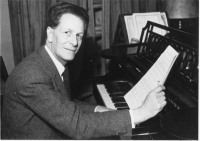
Frank Martin was a Swiss composer, who lived a large part of his life in the Netherlands.
Frank Loesser
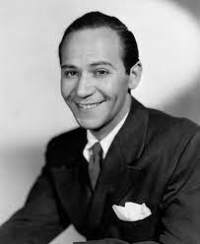
Frank Henry Loesser (/ˈlɛsər/; June 29, 1910 – July 28, 1969) was an American songwriter who wrote the music and lyrics for the Broadway musicals Guys and Dolls, How to Succeed in Business Without Really Trying, and others. He won separate Tony Awards for the music and lyrics in both shows as well as shared the Pulitzer Prize for Drama for the latter. He also wrote songs for over 60 Hollywood films and for Tin Pan Alley, many of which have become standards, and was nominated for five Academy Awards for best song, winning once for "Baby, It's Cold Outside".
Charles-Valentin Alkan
Charles-Valentin Alkan (French: ; 30 November 1813 – 29 March 1888) was a French-Jewish composer and virtuoso pianist. At the height of his fame in the 1830s and 1840s he was, alongside his friends and colleagues Frédéric Chopin and Franz Liszt, among the leading pianists in Paris, a city in which he spent virtually his entire life.Alkan earned many awards at the Conservatoire de Paris, which he entered before he was six. His career in the salons and concert halls of Paris was marked by his occasional long withdrawals from public performance, for personal reasons. Although he had a wide circle of friends and acquaintances in the Parisian artistic world, including Eugène Delacroix and George Sand, from 1848 he began to adopt a reclusive life style, while continuing with his compositions – virtually all of which are for the keyboard.
S.E.N.S.

S.E.N.S. is a Japanese new age instrumental group formed in 1988, originally with two members. The name stands for "Sound, Earth, Nature, and Spirit" based on their spiritual policy. Origin: Japan (1988) Albums: Palace Memories, Wish, Asian Blue, Heaven's Song, MORE Genres: New-age music, Instrumental, Electronic music Record labels: Bertelsmann Music Group, Fun House, BMG JAPAN, INC.
Harry Potter and the Chamber of Secrets
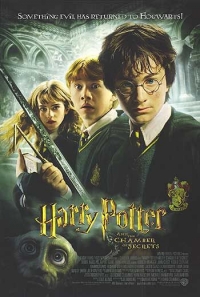
Harry Potter and the Chamber of Secrets is a 2002 fantasy adventure film, and the second film in the popular Harry Potter series, based on the novel by J. K. Rowling, Harry Potter and the Chamber of Secrets. The film was released on 15 November 2002 in the UK and US and 28 November in AUS (exactly three weeks after the death of Richard Harris, who portrayed Albus Dumbledore and from the first film) and was directed by returning director, Chris Columbus. The screenplay was adapted by returning screenwriter, Steven Kloves and David Heyman returns from the first film as the producer.
Most of the major cast and crew from Philosopher's Stone (also known as Sorcerer's Stone) returned for Chamber of Secrets, including child stars Daniel Radcliffe, Emma Watson, Rupert Grint and director Chris Columbus. However, it was the last appearance by Richard Harris as Dumbledore (and also Harris's last film) and the last Harry Potter film directed by Columbus. New key actors included Kenneth Branagh as Gilderoy Lockhart and Jason Isaacs as Lucius Malfoy.
The film was very well received at the box office making $879 million USD worldwide became number two of the year. The film was nominated for three BAFTA Film Awards in 2003.
Most of the major cast and crew from Philosopher's Stone (also known as Sorcerer's Stone) returned for Chamber of Secrets, including child stars Daniel Radcliffe, Emma Watson, Rupert Grint and director Chris Columbus. However, it was the last appearance by Richard Harris as Dumbledore (and also Harris's last film) and the last Harry Potter film directed by Columbus. New key actors included Kenneth Branagh as Gilderoy Lockhart and Jason Isaacs as Lucius Malfoy.
The film was very well received at the box office making $879 million USD worldwide became number two of the year. The film was nominated for three BAFTA Film Awards in 2003.
Rihanna

Rihanna (born Robyn Rihanna Fenty; February 20, 1988) is a Barbadian singer, model and fashion designer. She is the second artist, and first female, from Barbados to have received a Grammy Award (the first being Jimmy Senya Haynes). Rihanna is currently signed to the Def Jam Recordings label. She has attained four Billboard Hot 100 number ones thus far ("SOS", "Umbrella", "Take a Bow", and "Disturbia"), tying her with Mariah Carey and Beyoncé as the female solo artist with the most number ones this decade.
Rihanna came to fame in 2005 with the release of her debut album Music of the Sun, which featured her breakthrough single "Pon de Replay". Less than a year later, Rihanna released A Girl Like Me and gave her first number one single, "SOS". In 2007, Rihanna released her third studio album, Good Girl Gone Bad. The album has yielded six hit singles including five worldwide number one singles "Umbrella", "Don't Stop the Music" and "Take A Bow". Since the release of her debut album, Rihanna has amassed eleven top 40 hit singles in the U.S.
Rihanna came to fame in 2005 with the release of her debut album Music of the Sun, which featured her breakthrough single "Pon de Replay". Less than a year later, Rihanna released A Girl Like Me and gave her first number one single, "SOS". In 2007, Rihanna released her third studio album, Good Girl Gone Bad. The album has yielded six hit singles including five worldwide number one singles "Umbrella", "Don't Stop the Music" and "Take A Bow". Since the release of her debut album, Rihanna has amassed eleven top 40 hit singles in the U.S.
Tommy Emmanuel
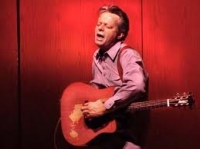
William Thomas "Tommy" Emmanuel AM (born 31 May 1955) is an Australian guitarist and occasional singer, best known for his complex fingerpicking style, energetic performances and the use of percussive effects on the guitar. In the May 2008 and 2010 issues of Guitar Player Magazine, he was named as "Best Acoustic Guitarist" in their readers' poll. In June 2010 Emmanuel was appointed a Member of the Order of Australia (AM).
A.Kastalsky

Alexandr Dmitriyevich Kastalsky was a Russian composer and folklorist. Kastalsky was born in Moscow to protoiereus Dmitri Ivanovich Kastalsky. He studied music theory, composition and the piano at the Moscow Conservatory.
Katy Perry

Katy Perry (born Katheryn Elizabeth Hudson; October 25, 1984) is an American singer-songwriter. She has risen to prominence with her 2008 single "I Kissed a Girl" which has become a worldwide hit topping the charts in more than 20 countries, including United Kingdom, Canada, Australia, Ireland, and the United States, where it was the 1000th Billboard Hot 100 number 1. Perry has stated in the press that it's thanks to successful British singer-songwriters Amy Winehouse and Lily Allen that more female artists had been appearing on the charts. She went on to say that Winehouse and Allen "have introduced America to great music". She is known for her unconventional style of dress, often humoristic, bright in color and reminiscent of different decades, as well as her frequent use of fruit-shaped accessories, mainly watermelon as part of her outfits. Perry has a contralto vocal range.
Ferruccio Busoni

Ferruccio Busoni is an Italian composer, pianist, piano and composition teacher and conductor. Date of birth: April 1, 1866, Empoli, Italy Date and place of death: July 27, 1924, Berlin, Germany Education: University of Music and Performing Arts, Vienna Books: Entwurf einer neuen Ästhetik der Tonkunst,
David Popper
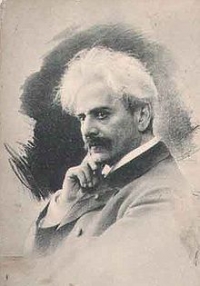
Popper was a prolific composer of music for his instrument, writing four concertos, a Requiem for three cellos and orchestra (1891) and a number of smaller pieces which are still played today, including the ever-popular cello solo piece Tarantella. His shorter showpieces were written to highlight the unique sound and style native to the cello extending the instrument's range to heights with pieces such as Spinnlied (Spinning Song), Elfentanz (Dance of the Elves), or the Ungarische Rhapsodie (Hungarian Rhapsody). He also wrote instructional pieces. Popper is also famous for his High School of Cello Playing (Op. 73), a book of cello études that is used almost universally by advanced cello students.
Alexander Scriabin
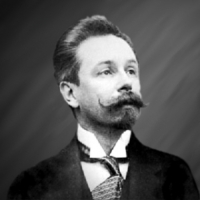
Alexander Nikolayevich Scriabin (/skriˈæbɪn/; Russian: Алекса́ндр Никола́евич Скря́бин; 6 January 1872 – 27 April 1915) was a Russian composer and pianist. Scriabin's early work is characterised by a lyrical and idiosyncratic tonal language influenced by Frédéric Chopin. Later in his career, independently of Arnold Schoenberg, Scriabin developed a substantially atonal and much more dissonant musical system, accorded to mysticism. Scriabin was influenced by synesthesia, and associated colors with the various harmonic tones of his atonal scale, while his color-coded circle of fifths was also influenced by theosophy. He is considered by some to be the main Russian Symbolist composer.
Scriabin was one of the most innovative and most controversial of early modern composers. The Great Soviet Encyclopedia said of Scriabin that, "No composer has had more scorn heaped or greater love bestowed..." Leo Tolstoy once described Scriabin's music as "a sincere expression of genius." Scriabin had a major impact on the music world over time, and influenced composers like Roy Agnew, Nikolai Roslavets, Sergei Prokofiev and Igor Stravinsky. Scriabin's importance in the Soviet musical scene, and internationally, drastically declined. "No one was more famous during their lifetime, and few were more quickly ignored after death." In the 1970s, for instance, there were only three recordings of his complete (published) sonatas. Yet Scriabin's work has steadily regained popularity in recent years.
Scriabin was one of the most innovative and most controversial of early modern composers. The Great Soviet Encyclopedia said of Scriabin that, "No composer has had more scorn heaped or greater love bestowed..." Leo Tolstoy once described Scriabin's music as "a sincere expression of genius." Scriabin had a major impact on the music world over time, and influenced composers like Roy Agnew, Nikolai Roslavets, Sergei Prokofiev and Igor Stravinsky. Scriabin's importance in the Soviet musical scene, and internationally, drastically declined. "No one was more famous during their lifetime, and few were more quickly ignored after death." In the 1970s, for instance, there were only three recordings of his complete (published) sonatas. Yet Scriabin's work has steadily regained popularity in recent years.
Ruth Pelham

Ruth Pelham is a singer, songwriter and educator who brings to the world a fresh vision of world peace and social change.
Green Day

Green Day is an American rock trio formed in 1987. The band has consisted of Billie Joe Armstrong (vocals, guitar), Mike Dirnt (bass guitar, vocals), and Tré Cool (drums, percussion) for the majority of its existence.
Green Day was originally part of the punk rock scene at 924 Gilman Street in Berkeley, California. Its early releases for independent record label Lookout! Records earned them a grassroots fanbase, some of whom felt alienated when the band signed to a major label.
The band has sold over 65 million records worldwide, They also have three Grammy Awards, Best Alternative Album for Dookie, Best Rock Album for American Idiot, and Record of the Year for "Boulevard of Broken Dreams".
Green Day was originally part of the punk rock scene at 924 Gilman Street in Berkeley, California. Its early releases for independent record label Lookout! Records earned them a grassroots fanbase, some of whom felt alienated when the band signed to a major label.
The band has sold over 65 million records worldwide, They also have three Grammy Awards, Best Alternative Album for Dookie, Best Rock Album for American Idiot, and Record of the Year for "Boulevard of Broken Dreams".
Koji Kondo

Koji Kondo (近藤浩治 Kondō Kōji?, born August 13, 1960) is a Japanese video game composer and sound director who has been employed at Nintendo since 1984. He is best known for scoring numerous titles in the Mario and The Legend of Zelda series.
 Sheet Music Max is a site for those who wants to access popular sheet music easily,
letting them download the sheet music for free for trial purposes.
It's completely free to download and try the listed sheet music, but you have to delete the files after 24 hours of trial.
Don't forget, if you like the piece of music you have just learned playing,
treat the artist with respect, and go buy the original sheet music.
Sheet Music Max is a site for those who wants to access popular sheet music easily,
letting them download the sheet music for free for trial purposes.
It's completely free to download and try the listed sheet music, but you have to delete the files after 24 hours of trial.
Don't forget, if you like the piece of music you have just learned playing,
treat the artist with respect, and go buy the original sheet music.
